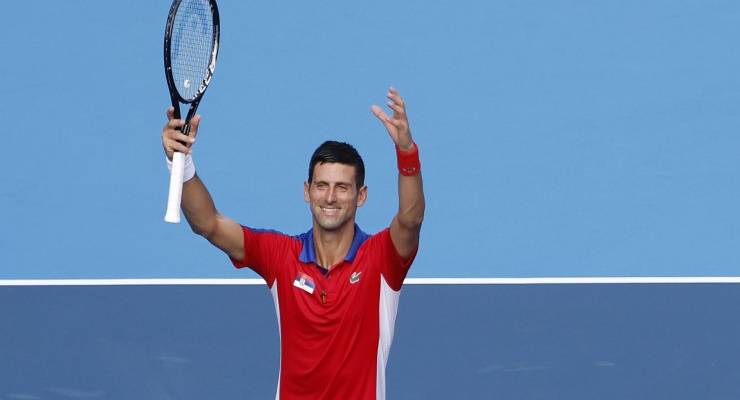
In a viral tweet, New York Times tennis writer Ben Rothenberg said that the three most reliably crowd-supported players in men’s tennis are Roger Federer, Rafael Nadal and whoever is playing Novak Djokovic.
As Djokovic stands on the precipice of securing every major record in men’s tennis history he struggles to secure a dedicated fan base.
At the Tokyo Olympics, where Federer and Nadal will both be absent, Djokovic has the potential to secure the second last piece of the first golden slam (all four grand slams and an Olympic gold in a calendar year). This is a big ask, but his recent dominance makes it well and truly within reach and would make his status as the greatest of all time even harder to negate.
So why doesn’t he enjoy support like that of Federer and Nadal?
Djokovic has done much to make himself unpopular: his opinions on vaccines; his controversial approach to wellness; his perceived arrogance; the disastrous Adria tour, a COVID super-spreader event — to name a few. However, there’s an argument that from the outset of his success, Djokovic was unfairly vilified.
He has been cast as the eastern European villain who disrupted and eventually superseded the historic rivalry of Federer and Nadal.
It starts with the story of a classic rivalry: Federer looks unbeatable through the mid-2000s until young challenger Nadal ascends to win the 2005 French Open at 19. Eventually, in a career-defining game for both players, Nadal defeats Federer on his best surface at Wimbledon in 2008. The pair produced enthralling tennis, and fans were thrilled.
It was in this climate that Djokovic emerged, reaching number one and winning three grand slams in 2011. But the tennis world already had their favourites in the Fedal rivalry, and there was no room for a third wheel.
There may also be a more sinister element to the tennis world failing to embrace Djokovic.
Western cinema loves to reflect political perspectives in its villains. From the Nazis in the Indiana Jones saga to Soviets in various James Bond films, the nationality of the bad guys is often tied to contemporary events and tensions. After the cold war and the 1990s Balkans conflict, eastern Europeans, and often specifically Serbians, became the villains of choice.
This was reflected in various mediums, with examples including The Expendables, Grand Theft Auto, 24, a series of forgettable late ’90s action films and even Mary-Kate and Ashley’s Our Lips are Sealed. While not seeking to assess the validity of such depictions, this ubiquity proves it is a stereotype that is pervasive, and one that Djokovic may well have been swept up in.
The ATP tour is heavily centred to the West after all, with the major tournaments in Australia, France, the UK and the US. Funnily enough, the only time Djokovic has guaranteed support is on the few occasions when Serbians are in the crowd.
On the surface, this might not mean much, but when compared with the stereotypes associated with his rivals, the point becomes clear. Federer comes from the land of chocolate, luxury watches and neutrality; Nadal’s country evokes sangria, Gaudi and salsa dancing. Add that to the timing of the “eastern European villain” arriving to defeat the much-loved Swiss and Spanish heroes, and it sounds like the plot of one of the aforementioned movies.
But Djokovic often doesn’t help himself with how he acts on court, and it could easily be argued that even with the disadvantages associated with Serbian stereotypes and timing, he has made himself unlikeable. A recent example was his whining about high winds during the 2019 French Open semi-final, an outdoor tournament where all players faced the same conditions.
However, at times it seems the deeply ingrained dislike goes further than it should. Plenty of players — John McEnroe and Jimmy Connors, even Lleyton Hewitt and Federer early in their careers — displayed a bad attitude but remain popular and respected. So does Djokovic deserve the disdain of the tennis world?
In light of his incredible mental resolve, unmatched consistency and skill, and seemingly genuine attempts to champion lower-ranked players, probably not. He is known for taking the time to greet every fan who waits to meet him and mentor up-and-coming players.
You certainly don’t have to love him, and his critics make valid points, but at the very least he deserves your respect.
Do you detest Djokovic? Are crowds right to dislike him, or is there something else at play? Let us know by writing to letters@crikey.com.au. Please remember to include your full name to be considered for publication.
Josefine Ganko is a final year student at ANU… and a huge tennis fan.








This article contains some pretty weak arguments. The “much-loved Swiss”? Come on. The “popular and respected” McEnroe and Hewitt? I call BS.
People don’t like Djokovic because he’s not very likeable, and because he’s become even less tolerable under COVID. Many tennis players are pretty unlikeable, and people are pretty happy to dislike them. He’s no different.
David Foster Wallace described Ivan Lendl in full-flight as like watching ‘Triumph of the Will’ in 3D, and Djokovic shares this relentlessness. He reminds me of the T-1000 cyborg from Terminator 2. Federer brought beauty back to men’s tennis, with his astounding movement and graceful backhand, and there’s his overwhelming decency. There might be something to the Eastern European prejudice theory of the article, in DFW’s comments on Lendl and in Western audience’s attitudes to Djokovic. However, I’d argue that this goes beyond an unfounded stereotype because Djokovic IS a Serbian nationalist, which is probably part of the reason for the general public’s antipathy towards him. And his howling, chest-beating, abuse of the crowd and general undignified behaviour don’t make him a terribly endearing figure.
Is Leyton Hewitt similarly so as an aussie?
Little Lleyton was brattish for sure, but he reminds me more of little dog syndrome than T-1000, always woofing crazily at bigger dogs. I don’t think Hewitt has ever had an actual political thought in his life, so as far as his ‘Aussie nationalism’ goes, I don’t think it compares to Djokovic’s documented Serbian nationalism, his disagreement with the existence of Kosovo and so on. I don’t pretend to understand the politics of this, nor the feelings of Serbian people after what was an incredibly complex and divisive war for all participants, but I can imagine Djokovic in a military uniform carrying out questionable duties, to put it mildly.
Probably because he is a Serbian and its Serbia in the middle of the EU that keeps giving the EU the finger. Media propaganda.
No, not because of his nationality. It’s simple. He’s just a tool and anti-vax. ‘Zero Covid’ Aussies won’t tolerate this.
He’s a great philanthropist though. Everyone is entitled to be an anti-vaxer* if that’s what they choose.
Philanthropy is a tool used to launder the reputations of the rich.
Ain’t that the truth?
Serbia is not in the EU but on the compliance and accession pathway. It’s generally older and/or less educated citizens who give the EU the finger (like other nations), but not youth or working age for whom the benefits are significant for them (and home nation).
I know that but becoming an EU member also implies NATO, you know the organisation that bombed it with depleted uranium munitions which are causing birth defects. The young as usual are ignorant and extremely envious of western TV reality shows.
No, NATO is nominally independent of the EU while most member nations are in NATO, many non member nations are in NATO too; like UEFA.
He’s nakedly mega competitive which can be trait Aussies don’t rate but it also what makes him the best
Australians (white Australians, in particular) are enormously competitive. Petulantly so. If it’s a trait they don’t rate in others it’s only because it’s a mirror to their own behaviour.
Articles like this are so pointless. Also, world is a bigger place that Western Europe, America and Australia. Just saying. If you can be bothered, go to Twitter and search for Djokovic handle. He is actually well liked.